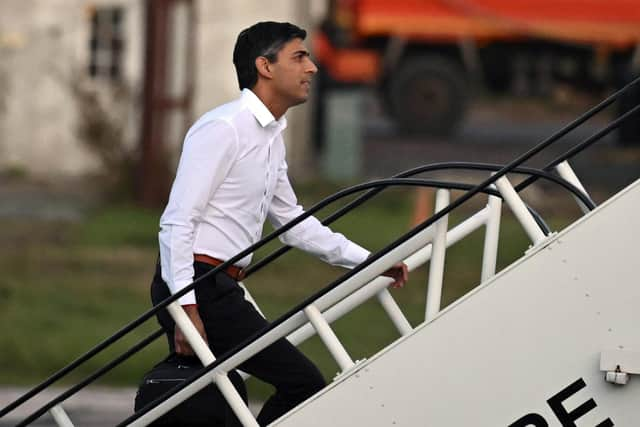Autumn statement: The Tories pivoting towards the EU and higher taxes is pointless - Brian Monteith
You can probably think of a few politicians that you cannot understand being re-elected time after time, despite the obvious sharp practices, deceit and even blatant, conscious lying (often described as misleading Parliament).
The truth is every party has its “guilty” good guys and its “innocent” bad guys. The trick is being able to discern who is in which camp.
Advertisement
Hide AdAdvertisement
Hide AdAnd another truth, I wager, is that many people vote for politicians – warts and all – because they are so devoted to a particular creed that the sins of politicians are forgiven, in practice turning such support into a cult; or are so worried or put off by the opposition that they hold their noses and vote for a party that will beat what they see as a threat to their concept of how we should live our lives.


If a party loses sight of what it is for, what its mission is and how to complete it, then the risk must be that the prevalence of charlatans making up the government, or party, will be dominated by charlatans whose sole purpose is remaining in power. Such people will be prepared to abandon the central beliefs they are meant to represent if it means they can secure power for another term – or obtain power for the first time.
Some readers might think I could be talking about the SNP under Nicola Sturgeon – for I know many nationalists who believe she is not serious about delivering independence, but is merely intent to stoking the fires of grievance so the core SNP vote turns out dutifully to keep her in power.
Others might think I could be talking about the Labour Party under Sir Keir Starmer’s leadership – for his support for policy positions is so obviously governed by how it might play with public approval rather than how it fits into the tenets of democratic socialism.
That such open interpretation exists is testimony to my argument that each party has its rogues and is open to taking a dishonest approach.
I am, however, writing about the current embodiment of the Conservative Party (readers may have noticed I have long abandoned using its full title of Conservative “and Unionist” as its delivery and acceptance of the Northern Ireland Protocol makes it no longer worthy of the proper name).
We have, in Rishi Sunak’s Conservatives, the prospect of a party that by the end of the week may be advocating higher taxes than what Starmer’s Labour is willing to support.
Thanks to Government announcements we shall hear in the run up to Christmas, and between then and spring, we shall be able to deduce just how much Sunak is the EU’s man in Downing Street, and how much his Chancellor Jeremy Hunt is the Treasury’s man in the Cabinet (rather than the Conservative’s man at the Treasury).The latest idea is to snare more people in the top tax rate.
Advertisement
Hide AdAdvertisement
Hide AdAlready Sunak is back-peddling fast on areas of policy that would mean the UK following its own economic self-interest in preference to shadowing EU regulations. The pursuit of identifying unnecessary EU regulations, many of which past Labour and Conservative governments objected to in council but were outvoted on 72 occasions so they became laws we did not need or want, has been abandoned.
Sunak, as chancellor, had previously submitted to Treasury pressure to prevent liberalising the new freeports into a genuine competitive threat to EU trade, and we can now expect the same suffocation by Sunak and Hunt of the “investment zones” that Liz truss had proposed. Again, for the same reason that such competitiveness and dynamic enterprise, is an affront to the EU’s crony corporatism.
Likewise, procedural concessions by the UK on customs checks at the, soon to be tangible, hard border between Great Britain and Northern Ireland are just waiting to be revealed. The abandonment of the Northern Ireland Protocol Bill is already being whispered about as part of an over-arching sop to President Joe Biden, while the commitment to holding fresh elections for Stormont has been spiked by the Irish Republic’s Taoiseach Micheál Martin – convincing the soft-touch Northern Ireland Office such an approach will change attitudes, when all it will do is harden them.
Just last week it was announced in Brussels by the EU, to its obvious joy, the UK would be entering into an agreement with its defence institutions – the first of what will be us signing-up for playing a full role in the EU’s defence and security command structure. It is a position that will weaken our ability to take decisions in our own interests and place future burdens on our people they will not have the power to reverse. No surprise that the agreement was not publicised in Whitehall.
On Thursday Hunt will stand up and announce tax increases that are not needed. There is now a queue forming of estimable economists who argue the supposed public finances black hole is nowhere near as big as being suggested – once put by Hunt at £40 billion and then raised by £10bn for “headroom” to make it £50bn.
The tax rises will not be as large as the rumours suggest and Starmer’s Labour will back some, but not all of them – just as Starmer’s Labour backed all but a few of former chancellor Kwasi Kwarteng’s tax cuts. This will leave room for Starmer to have a less punishing tax platform going into the election, making the Tories look pointless.
What are the Tories for? No wonder the Reform UK Party has moved up to 8 per cent in the polls.
- Brian Monteith is a former member of the Scottish and European Parliaments and a Senior Adviser to the Tax Reform Council
Comments
Want to join the conversation? Please or to comment on this article.